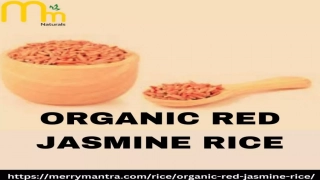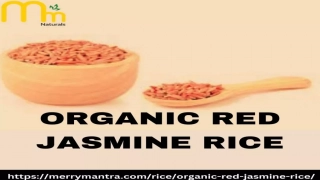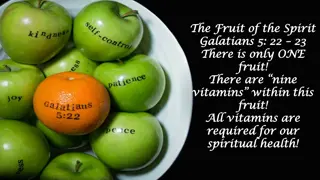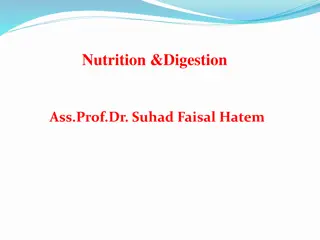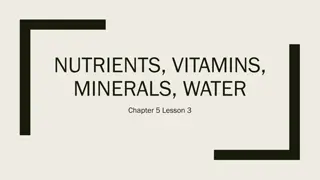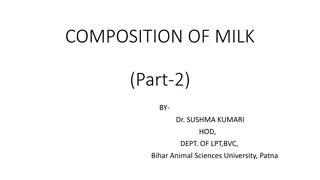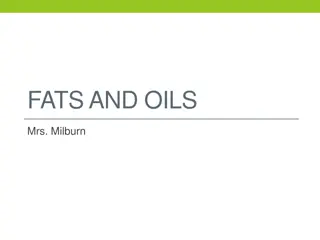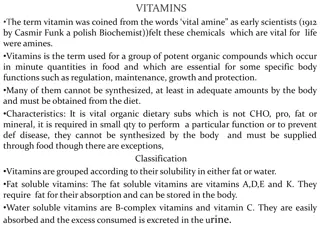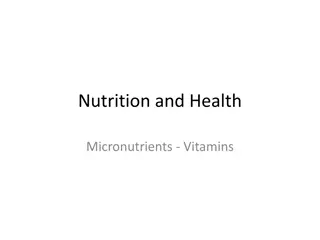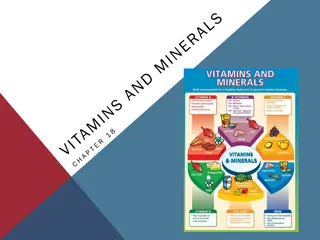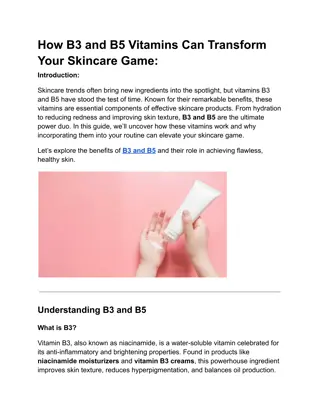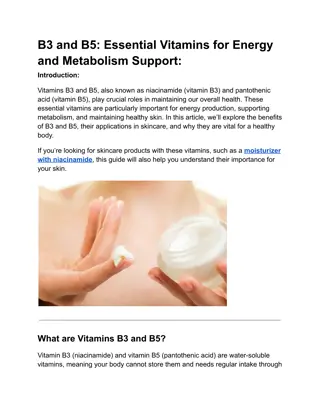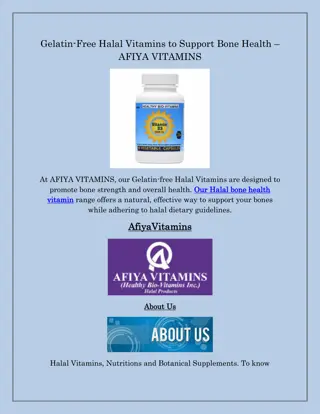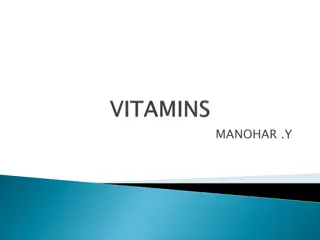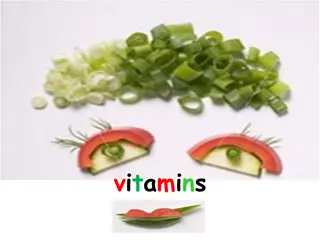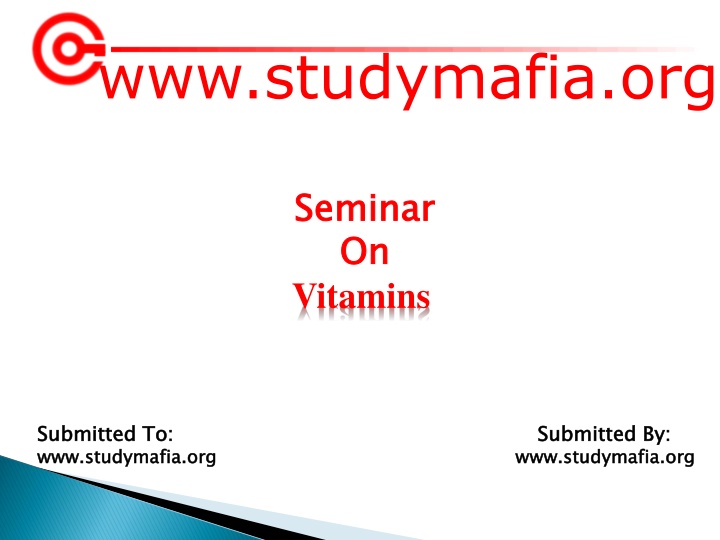
Vitamins: Types, Sources, and Benefits
Explore the world of vitamins, including the different types such as fat-soluble and water-soluble vitamins, their sources, and the important role they play in maintaining good health. Learn about essential nutrients that our body cannot produce on its own and must be obtained through food or supplements. Discover the functions of key vitamins like A, B, C, D, E, and K, and how they contribute to vision, bone growth, reproduction, and overall immune system health.
Download Presentation

Please find below an Image/Link to download the presentation.
The content on the website is provided AS IS for your information and personal use only. It may not be sold, licensed, or shared on other websites without obtaining consent from the author. If you encounter any issues during the download, it is possible that the publisher has removed the file from their server.
You are allowed to download the files provided on this website for personal or commercial use, subject to the condition that they are used lawfully. All files are the property of their respective owners.
The content on the website is provided AS IS for your information and personal use only. It may not be sold, licensed, or shared on other websites without obtaining consent from the author.
E N D
Presentation Transcript
www.studymafia.org Seminar Vitamins Seminar On On Submitted To: www.studymafia.org Submitted To: www.studymafia.org www.studymafia.org Submitted By: www.studymafia.org Submitted By:
What are Vitamins ? Types of Vitamins Vitamin A Vitamin B Vitamin C Vitamin D Vitamin E Vitamin K Reference
Nutrients that our body does not make on its own. Thus we must obtain them from the foods we eat, or via vitamin supplements. They are essential for providing good health and are necessary for many life functions.
Fat-Soluble Vitamins Water-Soluble Vitamins
Fat are happy to remain in your body for a while, some stay for some days, some for up to six months! Then, once it is time for them to be used, special carriers in your body take them to wherever they are required. Vitamins A, D, K, and E are all fat-soluble vitamins. Fat- -Soluble Vitamins Soluble Vitamins: : Fat-soluble vitamins
Water are totally different. after you eat foods that have soluble vitamins, the vitamins aren't getting keep the maximum amount in your body. Instead, they travel through your blood. whatever your body does not use comes out after you urinate. So, these types of vitamins are required to replace often as they do not stick around. Vitamins which come under this category are mentioned below: Pantothenic acid Biotin B2 (riboflavin) B1 (thiamin) Niacin B12 (cobalamine) Folic acid Water- -Soluble Vitamins Soluble Vitamins: : Water-soluble vitamins
Fat-soluble Retinol One of the most active, usable forms Found in animal and plant sources
Vision Generates pigments for the retina Maintains surface lining of eyes Bone growth Reproduction Cell division and differentiation Healthy Skin Regulate Immune System
Children 2000 3500 I.U. Men 5000 I.U. Women 4000 I.U.
The sources of Vitamin A are eggs, milk, butter, papaya, mango, liver fish, liver oil, sweet potatoes, green and yellow vegetables etc.
Vitamin B1 is very necessary for the growth. It is helpful in converting Carbohydrates to Energy. Deficiency of the Vitamin B1 causes Beri- Beri a disease of the Nervous System.
Main Sources of Vitamin B1 are: cereals, yeast, nuts, peas, potatoes and almost all the vegetables.
Ascorbic acid (Toxic to viruses,bacteria, and some malignant tumor cells) Antioxidant water-soluble
Protects you body from free radicals helps form connective tissue that hold your bones, muscles, and tissues together (collagen) aids in the healing of wounds aids the body in absorbing iron from plant sources helps to keep your gums healthy helps your body to fight infections aids in the prevention of heart disease helps prevent some forms of cancer
Guava, Broccoli, Cantaloupe, Red Bell Pepper, Orange Juice, Strawberries, Tomato Juice. Raw Tomato, Sweet Potato, Tangerine, Spinach, Leafy Greens, Berries, Citrus Fruits
Fat soluble Antioxidant Reduce the energy of the free radical Stop the free radical from forming in the first place Interrupt an oxidizing chain reaction to minimize the damage of free radicals
Protects cell membranes and other fat-soluble parts of the body (LDL cholesterol) from oxidation May reduce the risk of heart disease May also discourage development of some types of cancer Promotes normal growth and development Promotes normal red blood cell formation Acts as anti-blood clotting agent Plays some role in the body s ability to process glucose Also been known to aid the process of wound healing
Vitamin D aids our body in absorbing phosphorous and calcium from the food we eat. It deposits phosphorous and calcium in teeth and bones and makes them healthier and stronger. It also protects us from other infections by keeping our immune system healthy.
Vitamin K is essential for blood clotting. Deficiency of Vitamin K also affects in the healing of the injuries. Best source of Vitamin K are green leafy vegetables, like cabbages, spinach and cauliflower.
www.google.com www.wikipedia.com www.studymafia.org www.google.com www.wikipedia.com www.studymafia.org


